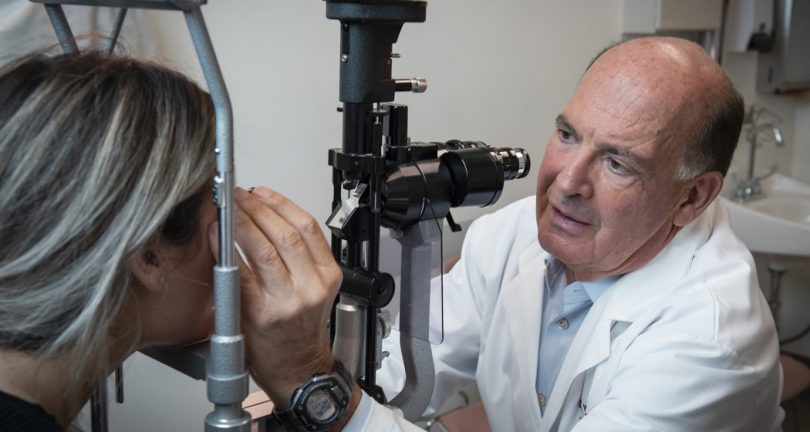In a recent survey, Canadians were asked what disability they would fear most. It wasn’t even close: 82% said they were most afraid of going blind. Fortunately, 75% of vision loss can be prevented with today’s advanced eye care diagnostics, treatment, and medication.
You could say Dr. William Ross is a sight for sore eyes. Literally. For 45 years, he’s been a vitreo-retinal specialist and key member of the ophthalmology team at St. Paul’s Hospital.
If you have macular degeneration or vision-related complications as a result of diabetes, there’s a good chance you’ll see Dr. Ross or one of his colleagues at St. Paul’s: they treat 14,000 patients a year for those conditions. Meanwhile, the eye clinic at Mount Saint Joseph Hospital (MSJ) specializes in cataracts (8,000 procedures a year), transplants (80% of BC’s corneal transplants are done at MSJ), and glaucoma. Together, the two hospitals are working to protect and improve not just their patients’ eyesight, but their quality of life.
To mark Eye Health Month, we asked Dr. Ross for his insight (no pun intended!) on what we can do to keep our eyes healthy for life. Here are his top tips.
1. See your optometrist for an annual eye exam. Dr. Ross says this is the foundation of life-long eye health. “Regular eye exams give us the opportunity for early detection and early intervention if we discover a problem.” Keep in mind, a thorough eye exam is much more than a vision test: it uses your eyes as a diagnostic tool to monitor existing conditions (like diabetes and high blood pressure) and to detect new ones such as MS, tumours, and even some types of cancer.
2. Know your family history. More than 5.5 million Canadians have health conditions that can lead to vision loss. “If you have a family history of high blood pressure, diabetes, or glaucoma, you have an elevated risk for eye disease. Talk to your family doctor about a referral to an ophthalmologist,” says Dr. Ross.
3. Manage your diabetes whether it’s type 1 or type 2. Your risk of going blind is 25 times higher if you have diabetes, so Dr. Ross puts particular emphasis on this point. “The vast majority of diabetes-related eye complications can be managed without serious vision loss as long as patients see their family doctors regularly. Not just to check on their general condition and blood sugar, but to have their eyes checked.” He is especially concerned that young diabetics take these precautions. “Blindness is a very real risk. Yet, some 25% of our young diabetic patients struggle to adhere to their treatment plan.” Dr. Ross is emphatic: “Protect your vision by trusting your doctor and taking your medication.”
4. Don’t ignore changes in your eyesight. Many people think that vision loss is an inevitable part of aging. It isn’t. But this mistaken belief keeps people from discussing their symptoms with their doctor in a timely fashion. Dr. Ross explains, “Age-related macular degeneration (AMD) is the most common cause of vision loss in Canadians over age 50.” In fact, more Canadians have AMD than have breast cancer, prostate cancer, Alzheimer’s disease, and Parkinson’s disease combined. “But over the last 15 years, we have developed revolutionary new diagnostic tools and treatments for AMD. At St. Paul’s, even when patients come in with severe vision loss, fully one third of them will regain enough sight to drive and read.” The treatment is so effective that, of the remaining two thirds, half will improve (although perhaps not to the point where they can drive) and half will prevent any further deterioration of their vision.” In other words, the earlier you discuss your symptoms with your doctor, the better your results are likely to be.
5. If it sounds too good to be true… Dr. Ross says most of us don’t need to take special supplements or eat special foods or to safeguard our eyesight. That said, he makes an exception for people in the early stages of dry-type AMD. “In these cases, specific anti-oxidants and micronutrients may help prevent the condition from worsening. But for everyone else, taking a pill or eating a lot of blueberries or carrots won’t save your eyesight. Instead, watch for changes in your vision, have regular eye exams, and always follow the treatments prescribed by your doctor.”
6. Don’t smoke. If you’re looking for another reason to quit, know this: smoking can lead to blindness. Dr. Ross is frank. “Smoking increases your risk of macular degeneration, cataracts, diabetes, and uveitis. And if you already have one of those conditions, smoking will make it worse.”
Story excerpted from St. Paul’s Foundation.





